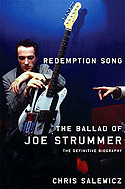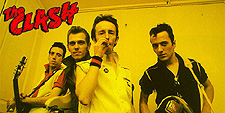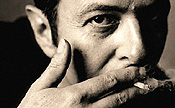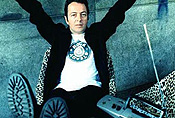 Chris Salewicz ('Redemption Song: Joe Strummer')
Chris Salewicz ('Redemption Song: Joe Strummer')
'Straight To Heaven'
December 22nd 2002 will go down as a sad day for rock music. At the tragically young age of 50, Joe Strummer, singer and lyricist with The Clash, passed away from a heart-attack. The great irony of his passing was that Joe Strummer was the heart and soul of the British punk movement of the mid-late seventies. A movement of music, style and attitude that still resonates today.
The Clash were one of the most important bands to come out of London, arguably second only to The Sex Pistols. And, whilst the Pistols have milked their name for profit and mainly faded from popular consciousness, Strummer, post-Clash, built his reputation to such heights that when he died he was an iconic and still important name in world rock music.
Starting off in the small punk clubs of London in 1976, The Clash broke through into the British charts, conquered America, and for a short time became the most important band in the world. From the punk manifesto that is London Calling through to their mega successful Combat Rock, Strummer lead his band to unimagined success only to see the band implode on the back of internal disputes.
Their eponymous first album ranks in Rolling Stone’s top ten albums of all time, and in 2003 the band was officially inducted into the Rock and Roll Hall of Fame. Since the break up of The Clash, Strummer worked on many diverse projects, all the time being held in the highest esteem by critics, fans and fellow musicians. He was a complicated fellow from an unlikely background, but everybody liked Joe and Joe liked everybody back.

Distinguished writer, and Strummer friend, Chris Salewicz has just published his exhaustive, 3 year work on the legend that is Joe Strummer. I asked him a few questions about his book and Joe.
If Joe was looking down on us, how do you think he would approve of the almost mythical and iconic status that he enjoys today? "A friend of mine had a dream. Joe was at a party at which Mick Jones and Paul Simonon were asking him what he felt about not being here anymore. He said, “It’s great. I’m getting all this publicity and I’m not having to do any work for it".”
After three and a half years and three hundred interviews, do you feel any closer to the real Joe than you did when you began the book? "Having lived with Joe for all that time, it would be hard not to feel very close to him. It was a profound experience: sometimes I would be laughing with joy whilst writing, other times tears would be pouring down my face."
Why do you think it is that, out of all the personalities that came out of the 1977 punk movement, Joe’s name has been the one to move into general popular culture? "Longevity, a phenomenal body of work, a way with a nifty phrase in interviews, extraordinary, possessed, stage performances, and an essentially accessible and quite palpable humanity. But above all, Joe had the biggest heart in punk and his - and The Clash’s – energy can still be felt globally. It’s ironic, of course, that it was Joe’s heart that let him down in the end."
It seems to me that the music, the words and the images of The Clash have been equally important in moving Joe into Springsteen territory as a working-class hero. How important do you think the images and photos of Joe have been in perpetuating this myth? "As a former art student, Joe – and Mick and Paul – were extremely aware of the power of the image. When The Clash set out at first they were only concerned that their stage performances should look breathtaking. Both Pennie Smith’s and Bob Gruen’s photographic work with The Clash set in stone the romantic, Peckinpah-esque image of the group and the individual members – as did David Mingay and Jack Hazan’s film Rude Boy. Great rock’n’roll artists – see also Elvis Presley, The Beatles and The Rolling Stones – have always understood the importance of the visual."

In the book you talk about Joe suffering – but he had a nice middle class upbringing and a private school education. Where do you think this suffering comes from? "Joe felt abandoned by his parents when he was dumped – as he saw it – at boarding-school at the age of nine. In fact, his parents – who were constantly shifted around the world due to his father’s overseas postings – probably had little choice in attempting to secure stable education for their boys. But I think Joe was tormented by the suicide of his brother David in July 1970, and it was a permanent burden for him. Even in such a statement of Joe’s as ‘He chose death – I chose life’ you can see the ambiguities and ambivalence, and even hear a sense of despair. His brother’s death was a huge motivating force, but also a source of acute pain. Joe, after all, could easily slip from that melancholy creative state into one of outright depression."
We were led to believe that punk was a working class movement, but it now transpires that it was played and followed by white middle class kids like Joe. With the benefit of hindsight, were we conned by punk? "Not really. In the Clash, Mick Jones and Paul Simonon were certainly working-class – as were all The Sex Pistols. But I think they all had an essentially classless sensibility, derived from their arty – if not actually art-school – perspectives. The ‘working-class movement’ line was something often imposed by the projections and wish-fulfilments of journalists. Tony Parsons’ article in the NME in April 1977 pretty much established the ‘tower-block rock’ legend of The Clash – but that vision was derived essentially from his own desires."
The second half of the eighties and much of the nineties were seen by Joe as the ‘wilderness years’; but he did a lot of acting, soundtracks and writing during that time. Do you think these years were seen as lost by him because he wasn’t as successful as when he was in The Clash? "Partially. I think it’s very hard for any successful artist to come down from a period of enormous activity and acclaim. But Joe seemed more at ease within himself when he was working on long-term projects: The Clash, the Mescaleros, even The 101’ers. Perhaps we all prefer those long railway tracks onto which we can slide life. Yet during that time Joe was arguing with certain issues within himself – and I think he was referring more to an internal wilderness."

The liner notes from your book state that the end of his life was a triumphant return to stardom. Isn’t it true that The Mescaleros are not as successful as The Clash; did it frustrate Joe that they never such reached heights? "Although The Mescaleros were not as successful as The Clash, they were still a big hit. Once again Joe was provided with a large audience, on a global scale. I always felt that by the time they made their fifth or sixth album, they would have a huge worldwide hit – a five-million seller, say – cementing Joe’s position. I don’t think he was frustrated: Joe would always claim to be ‘coldly realistic’ about the realities of the music business."
Now, nearly five year after his death, do you think that Joe’s legacy is worthy of the man? "The more you get to know about Joe, the more you understand why he still has such a global resonance. Joe is a figure on a level with Bob Marley, John Lennon and Bob Dylan, a true archetype and major artist of our time. The work stands up – it’s as simple as that."
Lastly, on the cover of your book, Joe is posed with a Fernandez guitar. Do you know what happened to the famous Fender Telecaster that Joe played in The Clash? "I believe it is still around, but I can’t remember where."
Interviewed by Peter 'Tab' Walker
www.FSGbooks.com
Back To Archives

